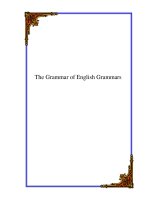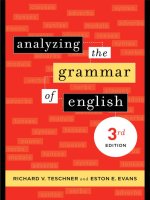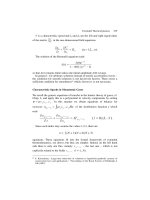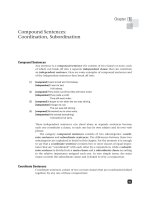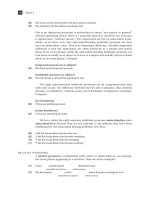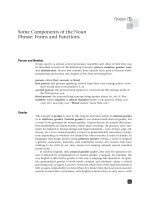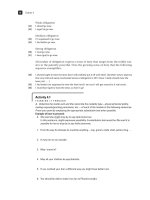Analyzing the Grammar of English Third Edition phần 9 potx
Bạn đang xem bản rút gọn của tài liệu. Xem và tải ngay bản đầy đủ của tài liệu tại đây (258.06 KB, 23 trang )
183
Chapter
8
Compound Sentences:
Coordination, Subordination
Compound Sentences
Any sentence is a compound sentence if it consists of two clauses or more, each
of which can break off into a separate independent clause that can constitute
an independent sentence. Here are some examples of compound sentences and
of the independent sentences they break off into:
[1] [compound] I went to bed and I fell asleep.
[independent] I went to bed.
I fell asleep.
[2] [compound] They made a profit but they still went under.
[independent] They made a profit.
They still went under.
[3] [compound] It began to rain when the sun was shining.
[independent] It began to rain.
The sun was still shining.
[4] [compound] He wanted me to arrive early.
[independent] He wanted [something].
I [should] arrive early.
These independent sentences can stand alone as separate sentences because
each one constitutes a clause, so each one has its own subject and its own verb
phrase.
The category compound sentences consists of two subcategories: coordi-
nate sentences and subordinate sentences. The differences between these two
subcategories are explained in detail in this chapter. For the moment it is enough
to say that a coordinate sentence contains two or more clauses of equal impor-
tance that are “coordinated” with each other by a conjunction, while a subordi-
nate sentence is divided into a main clause and a subordinate clause according
to the relative importance assigned each one. In very simple terms, the main
clause controls the subordinate clause and is linked to it by a conjunction.
Coordinate Sentences
Coordinate sentences consist of two or more clauses that are coordinated (linked
together) by any one of these conjunctions:
183-210.Teschner.08.indd 183183-210.Teschner.08.indd 183 4/2/07 6:13:31 PM4/2/07 6:13:31 PM
Chapter 8
184
and (either)/or (neither)/nor but yet for
An easy rhyming mnemonic device can be used to recall them: and-or-nor, but-
yet-for. Here are some examples of coordinate sentences that use the conjunc-
tions and, (either)/or, (neither)/nor, but, for, and yet:
[5] Perry paid the rent and Bill bought the groceries.
[6] Carol rode sidesaddle but Pat rode astride.
[7] Victor has just made his last purchase, for he has lost all his credit cards.
[8] I never met the man, yet he looks so familiar.
[9] I’ll do it or I’ll die trying. (Either I’ll do it or I’ll die trying.)
[10] Jack doesn’t want to play tennis, nor does Jill want to go swimming.
[11] Neither Jack nor Jill wants to dig up weeds.
Because sentences (5)–(11) are compounds, each one of its clauses can stand apart
as an independent sentence, as the following will show:
[5a] Perry paid the rent.
[5b] Bill bought the groceries.
[6a] Carol rode sidesaddle.
[6b] Pat rode astride.
[7a] Victor just made his last purchase.
[7b] He has lost all his credit cards.
[8a] I never met the man.
[8b] He looks so familiar.
One of the chief traits of coordinate sentences is that their clauses cannot par-
ticipate in intrasentential (within a sentence) movement. Intrasentential move-
ment involves a change like this: A B → B A, that is, a sentence where clause A
comes first and clause B comes second, which changes into a sentence where B
comes first and A comes second. Coordinate sentences do not allow intrasenten-
tial movement, as these examples show:
[12] *And Bill paid for the groceries, Perry paid the rent.
[13] *But Pat rode astride, Carol rode sidesaddle.
[14] *For he has lost all his credit cards, Victor just made his last purchase.
[15] *Yet he looks so familiar, I never met the man.
[16] *Or I’ll die trying, I’ll do it.
[17] *Nor does Jill want to go swimming, Jack doesn’t want to play tennis.
It turns out that while coordinate sentences do not allow intrasentential move-
ment, subordinate sentences do allow it, as is illustrated by the following exam-
ples, which employ subordinating conjunctions such as when, although, while,
and because (of):
[18] Ken laughed when Gustavo cried. → When Gustavo cried, Ken laughed.
[19] Carol rode sidesaddle although Pat rode astride. → Although Pat rode astride, Carol rode
sidesaddle.
[20] Jack doesn’t want to play tennis, while Jill doesn’t want to go swimming. → While Jill doesn’t want
to go swimming, Jack doesn’t want to play tennis.
183-210.Teschner.08.indd 184183-210.Teschner.08.indd 184 4/2/07 6:13:32 PM4/2/07 6:13:32 PM
185
[21] The big bad wolf couldn’t blow the house down because of the hurricane. → Because of the hur-
ricane, the big bad wolf couldn’t blow the house down.
The six coordinating conjunctions are and/(either)or/(neither)nor and but/yet/for,
as we already know. These six are subclassified according to function. The con-
junctions and, (either)/or and (neither)/nor can link more than two clauses, whereas
but, yet, and for cannot. Here is proof:
Linking more than two clauses (and, [either]/or, [neither]/nor):
[22] Mrs. Schnabel does the laundry and Mr. Schnabel washes the dishes and Joey Schnabel makes
the beds and Julie Schnabel cleans the house and little Janie Schnabel “helps out” with tiny
toy brooms.
[23] Either Rick tells me the news or Sandy lets me know what’s happening or Robert keeps me up to
date or Chuck clues me in on who has done and said what, where, when, and to whom.
[24] Neither Albert nor Eric nor Jennie nor Emma has ever told me one bleeping thing. [Note that
(neither)/nor consistently produces elliptical (shortened, reduced) compound sentences all but
one of whose clauses delete the verb. Sentence (11) offered another example of that.]
Linking two clauses only (but/yet/for):
[25] Mary loves falafel but hates tofu.
[26] *Mary loves falafel but hates tofu but can’t stand eggplant.
[27] The clown walks a tightrope yet gets nervous driving a car.
[28] *The clown walks a tightrope yet gets nervous driving a car yet is afraid of airplanes.
Because but/yet/for cannot join together more than two clauses, in coordinate
sentences containing more than two clauses, but/yet/for can appear only at the
beginning of the final clause, thus:
[29] Mary hates tofu and eggplant but loves falafel.
[30] The clown gets nervous driving a car and is afraid of airplanes but walks a tightrope.
Coordinate sentences typically economize by deleting redundant information from
the second clause (or subsequent clauses), thus creating elliptical constructions
(ellipses). In the examples that follow, the deleted information appears in brack-
ets and the one added pro-word is italicized.
[31] Mary loves falafel but [Mary] hates tofu.
[32] Harry has been trying to build a neutron bomb, and Jack has [been trying to build a neutron bomb]
too.
[33] Harry has been trying to build a neutron bomb, and so has Jack [been trying to build a neutron
bomb].
[34] Harry hasn’t been trying to build a neutron bomb, and neither has Jack [been trying to build a
neutron bomb].
[35] Harry hasn’t been trying to build a neutron bomb, and Jack hasn’t [been trying to build a neutron
bomb] either.
[36] Mrs. Schnabel does the laundry, Mr. Schnabel [does] the dishes, Joey [does] the windows, and
Julie [does] the house cleaning.
In a coordinate sentence, which clause goes first? In many coordinate sen-
tences there are no logical constraints on the order in which the various clauses
Coordinate Sentences
183-210.Teschner.08.indd 185183-210.Teschner.08.indd 185 4/2/07 6:13:32 PM4/2/07 6:13:32 PM
Chapter 8
186
can appear, so any one of the several clauses can go first, second, third, or
wherever:
[36a] Marilyn will bring the salad and Ken will bring the wine and Geri will bring the dessert.
[36b] Ken will bring the wine and Marilyn will bring the salad and Geri will bring the dessert.
[36c] Geri will bring the dessert and Ken will bring the wine and Marilyn will bring the salad.
[37a] Sam will wash the dishes or John will.
[37b] John will wash the dishes or Sam will.
In other coordinate sentences, however, there are logical constraints on the order
in which the various clauses can appear. Observe what happens when the clauses
are switched in the following sentences:
[38a] You’ll do it right or I’ll punch you in the nose.
[38b] *I’ll punch you in the nose or you’ll do it right.
[39a] You drank infected water and you got cholera.
[39b] *You got cholera and you drank infected water.
Sentences (38) and (39) show that the logical order of events in the real world
will affect the syntactic order of the elements in a sentence. This is true even
though each of any two particular coordinate clauses has the same structure.
However, this is not the case when we change coordinate sentences into their
subordinate equivalents, as the following will show:
[40a] If you don’t do it right I’ll punch you in the nose.
[40b] I’ll punch you in the nose if you don’t do it right.
[41a] Because you drank infected water you got cholera.
[41b] You got cholera because you drank infected water.
Activity 8.1
THINKING IT THROUGH
A. These are all coordinate sentences. Divide each into its several independent components.
Example of how to proceed:
X. Yesterday I promised to go on the wagon but today I drank a quart of gin.
“Yesterday I promised to go on the wagon. Today I drank a quart of gin.”
1. Leslie lay down on the sidewalk and Miriam picketed.
2. The boulder was perched perilously close to the edge of the cliff, yet it still didn’t move.
3. Paulie had a permit to eat like a horse but he still refused to pig out.
4. I didn’t want anything more to drink, for I was already high.
5. Either your dad will get the telegram or your mom will get the letter.
6. Neither Western Union delivered the telegram nor the post office delivered the letter.
7. Joyce studied the verbs and Bruce studied the nouns and Vince studied the syntax.
183-210.Teschner.08.indd 186183-210.Teschner.08.indd 186 4/2/07 6:13:33 PM4/2/07 6:13:33 PM
187
B. In the following coordinate sentences, write in any words or phrases that have been
deleted—producing an ellipsis—or changed wherever deletion has taken place.
Example of how to proceed:
X. The director visited the class and commented how great it was. “An ellipsis has been
produced between and and commented; the words deleted are the director.”
1. The driver saw the accident but failed to stop.
2. Julie and Frank play the trombone.
3. Julie plays in the school band and Frank does too.
4. Aunt Alice won’t teach you to drive the car but Aunt Sally will.
5. Steve held his breath, ran, jumped, and landed in a pile of sawdust.
6. Pete has a white and a black ’57 Chevy.
7. We arrived at the party after 8:30 and so did the Szymanskis.
8. My next-door neighbor just bought a new piano, a new iPod, and a new laptop.
9. That old grouch has absolutely no patience, nor does his wife.
10. Jerry scored twenty points, Mike eleven, and Tom three.
11. Did you write me last or I you?
12. You’ve got to get rid of your hamster, your snake, or your monkey.
13. I haven’t, but Jackie has received a check.
14. My wife swore she would never get a permanent, but she ended up doing so after all.
C. Using grammar terms, describe what is wrong with these sentences.
Example of how to proceed:
X. *Yet they just couldn’t stop eating super-sized orders, they had already gained a hun-
dred pounds apiece. “The correct version of this would be: ‘They had already gained
a hundred pounds apiece, yet they just couldn’t stop eating super-sized orders.’ The
coordinating conjunction yet cannot participate in the sort of intrasentential movement
that the asterisked sentence presents. Also, its logical sequencing is incorrect.”
1. *We decided to order the third entree and looked at the menu.
2. *Yet I was still hungry, I ate three blue-plate specials.
3. *The teacher will fail you, or you’ll have to work harder.
Coordinate Sentences
183-210.Teschner.08.indd 187183-210.Teschner.08.indd 187 4/2/07 6:13:34 PM4/2/07 6:13:34 PM
Chapter 8
188
4. *Yet I still couldn’t make up my mind, I knew I was in trouble.
5. *But he planned to take the 3:49 bus, he didn’t arrive on time.
6. *Jack sat down and walked slowly into the room.
7. *The grease kept on burning, but the cook squirted it with his fire extinguisher.
8. *Mrs. García made the tamales, Dolores made, Jesse the, and Mr. García.
WRITING IT OUT
D. Use each word in a compound coordinate sentence that you invent.
1. and
2. or
3. but
4. nor
5. yet
6. for
7. either . . . or
Subordinate Sentences
The notion that sentences can consist of more than one clause first appeared in
chapter 6, where we discussed two kinds of sentences. Both had more than one
clause and were thus compound: (1) comparative sentences (Sally runs faster than
her brother [can]), and (2) relative clause sentences (He knows the man [whom] I saw
yesterday at the bank). These sentences are similar to the subordinate sentences we
have been discussing in this chapter. Subordinate sentences’ basic structures dif-
fer from coordinate sentences’ basic structures. Let’s look at the differences. The
basic structure of a coordinate sentence looks like this (fig. 8a):
[42] We had an accident and we called the police.
However, the basic structure of a subordinate sentence looks like this (fig. 8b):
[43] We had an accident before we called the police.
183-210.Teschner.08.indd 188183-210.Teschner.08.indd 188 4/2/07 6:13:35 PM4/2/07 6:13:35 PM
189
In (43) the two independent sentences (We had an accident, We called the police)
are not viewed as equal in status: the second is subordinate to the first. Yet the
two independent sentences in (42) are viewed as equal in status: neither is sub-
ordinate to the other. But in a subordinate sentence, one independent sentence
component is viewed as the main clause and the other as the subordinate
clause. The main clause is often the first clause, thus:
[44] We had an accident before we called the police.
main clause subordinate clause
But this syntax is not set in stone, as the following movement will show:
[45] Before we called the police, we had an accident.
subordinate clause main clause
Even though (45)’s subordinate clause appears in sentence-initial position, we
can still identify it as a subordinate clause because it is the clause that begins
with the subordinating conjunction. There are quite a few subordinating con-
junctions, and they are used in a wide variety of ways. Here are some of the more
common subordinating conjunctions:
although since
as so
because that
before unless
even if when
if while
Subordinate Sentences
Figure 8a The Structure of a Coordinate Sentence
coordinate sentence (CS)
coordinating
conjunction
We
predicate
had an accident
subject
clause 1
clause 2
we
predicate
called the police.
subject
and
Figure 8b The Structure of a Subordinate Sentence
subordinating
conjunction
(before)
We
predicate
had an accident
subject
main clause
subordinate clause
we
predicate
called the police.
subject
183-210.Teschner.08.indd 189183-210.Teschner.08.indd 189 4/2/07 6:13:35 PM4/2/07 6:13:35 PM
Chapter 8
190
Another way to determine which clause is main and which is subordinate is to
ask: which clause cannot appear alone exactly the way it is written? The clause
that cannot appear alone as written is the subordinate clause, as the following
shows:
[46] *Before we called the police.
This separate sentence—*Before we called the police—cannot stand alone as an
independent proposition, though it can and does function as part of a longer
narrative [When did you have an accident?—Before we called the police] in which it
is logically subordinate to We had an accident.
[47] We had an accident.
This sentence can stand alone as an independent proposition, so we call it the
main clause. One important role subordinate clauses play is that they comple-
ment main clauses by adding information to them. This is called clausal com-
plementation (also known as sentential complementation). Clausal comple-
mentation produces clausal complements and takes these five forms:
A. clausal adverb complement
B. clausal object or subject complement
C. clausal predicate nominative complement
D. clausal noun complement
E. clausal adjective complement
Let’s now analyze each of these five complement types.
CLAUSAL ADVERB COMPLEMENTS
Subordinate clauses that function as adverbs are viewed as clausal adverb com-
plements. Here is an illustration:
[48a] We called the police after we had an accident.
The italicized clause answers the adverbial question When? Another way to prove
a clause is adverbial is to paraphrase it by using the word then:
[48b] We called the police after we had an accident. → Paraphrase: We called the police then.
In this paraphrase, the single-word adverb then successfully substitutes for the
clause after we had an accident. This adverbial complement designates time.
Clausal adverb complements also designate manner, gradation, standpoint,
cause, and condition:
[49] By the way you exaggerate everything, you look like a fool. [manner]
[50] No one makes more money in a year than Warren (makes). [gradation]
[51] Epstein’s defense was flawed from the way the jury saw it. [standpoint]
[52] Homer can’t lie because his eyes always give him away. [cause]
[53] If she had saved some money, she wouldn’t be in this fix. [condition]
183-210.Teschner.08.indd 190183-210.Teschner.08.indd 190 4/2/07 6:13:36 PM4/2/07 6:13:36 PM
191
CLAUSAL OBJECT OR SUBJECT COMPLEMENTS
In this type of subordinate complementation, entire clauses function as objects
or subjects of the main clause’s verb. Compare the “a” sentences’ multiword
objects/subjects with the “b” sentences’ one-word objects/subjects: the “b”s are
paraphrases that prove that the “a”s have functioned as objects or subjects.
[54a] David assumes that Joe ate up all the bread.
[54b] David assumes something. = clausal object
[55a] I don’t know how David reached that conclusion.
[55b] I don’t know something. = clausal object
[56a] How quickly he ate up all the bread astounded David.
[56b] Something astounded David. = clausal subject
[57a] That Joe ate up all the bread astounded David.
[57b] Something astounded David. = clausal subject
[58a] David said that Heanon knew that Joe ate up all the bread.
[58b] David said something. = clausal object
[59a] That David said that Heanon knew that Joe did it shocked everyone.
[59b] Something shocked everyone. = clausal subject
Note that in (58a) and (59a), one that-clause appears inside another that-clause.
Sentence (58a) would look like this in an abbreviated tree (fig. 8c). Multiple com-
plementing can go on indefinitely, as the following shows:
[60] Connie says that Heanon says that Joe says that Joyce says that Carol says that Mary Gay says
that Henry says that John says that Mrs. Dutton says that Mr. Kasten says that . . .
In real-world usage, any hypercomplementation of this sort is limited by consid-
erations of style and short-term memory to five clauses at the utmost.
Sentences like (56), (57), and (59) can be rewritten so that they begin with
what is known as the dummy subject it:
Subordinate Sentences
Figure 8c The Structure of Multiple Complementing with that-Clauses
CS
main clause
David
NP
subject
predicate
NP
said
[something =]
V
that subordinate clause: Heanon knew [something =]
that subordinate clause: Joe ate up all the bread
VP
183-210.Teschner.08.indd 191183-210.Teschner.08.indd 191 4/2/07 6:13:37 PM4/2/07 6:13:37 PM
Chapter 8
192
[61] It astounded David that Joe ate up all the bread.
[62] It astounded David how quickly he ate up all the bread.
[63] It shocked everyone that David said that Heanon knew that Joe did that.
This word order is known as extrapositional coreferentiality. It involves adding
the word it as a dummy subject; the dummy subject then appears at the begin-
ning of the sentence, separated from the rest of the sentence. Extrapositional
means that the it is extra (beyond) the position (part of the sentence) it is co-
referential with, the part that also appears in italics (how quickly he ate up all the
bread/that Joe ate up all the bread, etc.
The extrapositional coreferential it differs significantly from the it-cleft it that
we discussed in chapter 7. The following section will show that.
[64] The extrapositional coreferential it
It astounded David that Joe ate all the bread.
([64] derives from That Joe ate all the bread astounded David.)
[65] The it-cleft it
It was David who was astounded that Joe ate all the bread.
([65] derives from David was astounded that Joe ate all the bread.)
Although most clausal subjects can become extrapositional coreferential its,
clausal objects can only become extrapositional coreferential its under these
conditions: (a) when the objects appear in the passive voice—
[66] It was believed by Heanon that David was lying.—
or (b) when delayed objects appear in sentences with main clause verbs such as
believe or perceive:
[67] David believes it unlikely that Joe will eat any more bread now.
delayed clausal object
CLAUSAL PREDICATE NOMINATIVE COMPLEMENTS
Predicate nominatives can also appear as subordinate clauses beginning with
that. Remember that a predicate nominative is a noun that (a) comes after a
copula verb such as be and that is (b) coreferential to the noun that appears in
the subject part of the clause (example: Paula is a doctor). The subject clause is
linked to the predicate nominative clause by the usual copula verb be or by seem,
appear, look, etc. Examples:
[68] The investment plan will be that you put your money in bonds.
[69] The name of the game seems to be that you declare yourself innocent of any premeditated intent
to draw and quarter the victim.
CLAUSAL NOUN COMPLEMENTS
It is also possible for a noun to be complemented by a that-clause, as is shown by
these examples whose complemented nouns appear in bold:
[70] The very idea that Mario took such a job was insane.
[71] The notion that deficit spending doesn’t matter has ruined many a nation’s economy.
183-210.Teschner.08.indd 192183-210.Teschner.08.indd 192 4/2/07 6:13:38 PM4/2/07 6:13:38 PM
193
The that of sentences (70) and (71) is a complementizing conjunction and not
a relative pronoun. We can prove this by attempting (and failing) to substitute
other relative pronouns for that:
[70a] The very idea that Mario took such a job was insane.
[70b] *The very idea which Mario took such a job was insane.
[71a] The notion that deficit spending doesn’t matter has ruined many a nation’s economy.
[71b] *The notion which deficit spending doesn’t matter has ruined many a nation’s economy.
CLAUSAL ADJECTIVE COMPLEMENTS
In these constructions, the complementizing clause is coreferential to an adjec-
tive (appearing here in bold), explaining it or adding more information to it.
Here are some examples:
[72] Richard was extremely sad that Andrés died.
[73] They were annoyed that the computer broke down.
Activity 8.2
THINKING IT THROUGH
A. In each sentence, separately underline each clause—main as well as subordinate—in
the compound sentence, then give the name of the type of complement (clausal adverb,
clausal object or subject, clausal predicate nominative, clausal noun, or clausal adjective)
that each subordinate clause exemplifies.
Example of how to proceed:
X. Our intention is that all good people should come to the aid of the party. “The main
clause is Our intention is. The subordinate clause is that all good people should come to
the aid of the party. The subordinate clause is an example of clausal noun complemen-
tation, with the complemented main clause noun being intention.”
1. Mary told Phillip that Dwight was writing a book.
2. Mary seemed to be glad that Lillian prevaricated.
3. That Lillian had told so many lies proved hard to believe.
4. The object of ice hockey seems to be that the players maim each other.
5. Richard seemed to realize what was happening while Lee was telling his story.
6. It was accepted by Larry that his mother needed a nurse.
7. Jacob wrote Jessie that his ladder had been stolen.
8. How I’m supposed to lift this by myself I can’t imagine.
9. The fact that you had an affair with Susie can only prove that you don’t love me after all.
10. Martha thought that she was at the fights when suddenly a hockey game broke out.
Subordinate Sentences
183-210.Teschner.08.indd 193183-210.Teschner.08.indd 193 4/2/07 6:13:38 PM4/2/07 6:13:38 PM
Chapter 8
194
11. Sam listened to opera while the dogs chewed the chair in the basement.
12. Do you really believe that it’s time that we free the Indianapolis 500?
13. You failed to write and you never called, but you always show up when there are Christ-
mas presents to be had.
14. Guy said that Sandy said that Marilyn thought that the very idea that students would
cheat on their doctoral exams was shocking.
15. I tried to tell Felisa I was frantic that Fred failed French Friday.
WRITING IT OUT
B. Write one original sentence corresponding to each description.
1. coordinate sentence with but
2. coordinate sentence with and
3. coordinate sentence with yet
4. subordinate sentence with a clausal adverb complement
5. subordinate sentence with a clausal object complement
6. subordinate sentence with a clausal subject complement
7. subordinate sentence with a clausal predicate nominative complement
8. subordinate sentence with a clausal noun complement
9. subordinate sentence with a clausal adjective complement
10. extrapositional coreferential it
11. it-cleft it
C. Complete the following sentences with any clausal complement that works. Then name
the type of complementation that you have used.
Example of how to proceed:
X. Joe swears that David was telling lies about the bread. This is an example of clausal
object complementation.
1. It amazed Cathy that
2. David can’t lie because
183-210.Teschner.08.indd 194183-210.Teschner.08.indd 194 4/2/07 6:13:39 PM4/2/07 6:13:39 PM
195
3. Connie doesn’t know where
4. It astounded Joe that
5. That Michelle cried for hours and hours
6. Their idea seems to be that
7. The concept that
8. Yvette is very angry that
Tenseless Complements
INFINITIVES AND GERUNDS AS TENSELESS VERBAL COMPLEMENTS
In addition to the various types of clausal complementation—adverb, object,
subject, predicate nominative, noun, and adjective—that we have just discussed,
English has two additional complement types commonly known as tenseless
complements because they involve the two nonfinite forms of the verb—the
infinitive and the gerund/present participle. Here are examples of each of these
two new complement types as contrasted with the five complement types we
have already looked at:
The two new types of complementation
Infinitive Complement
[74] I recommend for him to arrive on time.
Gerund/Present Participle Complement
[75] I recommend his arriving on time.
The five old types of complementation
Clausal adverb complement (Nobody complains because he arrives on time)
Clausal object or subject complement (with or without extrapositional co-
referentiality) (I recommend that he arrive on time; It is I who recommend that
he arrive on time; It is highly uncertain that he will arrive on time)
Clausal predicate nominative complement (Our heart’s desire is that he arrive on
time)
Clausal noun complement (The very idea that he arrives on time is nigh impossible
to conceive)
Clausal adjective complement (She is ecstatic that he is arriving on time)
Let us now focus on the two new types of complementation, which we will
contrast with just one of our five old types, the clausal object complement. The
three types (as exemplified by I recommend for him to arrive on time, I recommend
his arriving on time, I recommend that he arrive on time) paraphrase each other; in
essence they mean the same. All three consist of two propositions: (1) I recom-
mend [something], and (2) He [should] arrive on time. As we learn in greater
detail below, the infinitive complement sentence (I recommend for him to arrive on
Tenseless Complements
183-210.Teschner.08.indd 195183-210.Teschner.08.indd 195 4/2/07 6:13:39 PM4/2/07 6:13:39 PM
Chapter 8
196
time) requires us to change a subject pronoun (he) into an object pronoun (him)
and to use a tenseless verb form, the infinitive to arrive. We also learn below that
the gerund complement (I recommend his arriving on time) changes the subject
pronoun he into its corresponding possessive determiner his and requires as its
complement a tenseless verb form—the gerund arriving.
Not all main clause matrix verbs behave like recommend, which allows all
three complement types. Some main clause verbs—such as believe—allow only a
clausal object that-clause complement:
[76] I believe that he leaves early.
[77] *I believe him to leave early.
[78] *I believe him leaving early.
Other main clause verbs allow only infinitive complements:
[79] *I let that he leave early.
[80] I let him leave early.
[81] *I let him leaving early./*I let his leaving early.
Still other main clause verbs allow only gerund complements:
[82] *I flattered him into that he leave early.
[83] *I flattered him into leave early.
[84] I flattered him into leaving early.
And some main clause verbs allow two (but not three) different types of com-
plementation: infinitive complements and gerund complements only, or that-
clauses and infinitive complements only, as in the following examples:
[85] I begged that he leave early.
[86] I begged him to leave early.
[87] *I begged him leaving early.
What is more, not all possible types of complement sentences have the same
meaning, as the following will show:
[88] [that-clause] Mary decided that she was sick.
[89] [infinitive complement] Mary decided to be sick.
[90] [infinitive complement] Sandy stopped to fasten her seatbelt.
[91] [gerund complement] Sandy stopped fastening her seatbelt.
But most permissible complement types do have the same meaning, which is
why they are best presented together in the same section of a textbook.
Native speakers of English understand and produce these three types of com-
plement sentences with little if any effort. But for many nonnative speakers, the
acquisition of a three-way complementation system can be quite a job, especially
if their native language’s complementation system is simpler or works differ-
ently. Spanish, for example, largely limits its complements to just one, the that-
clause complementation, as the following reveals:
183-210.Teschner.08.indd 196183-210.Teschner.08.indd 196 4/2/07 6:13:40 PM4/2/07 6:13:40 PM
197
[92] Yo quiero que ella salga inmediatamente.
*I want that she leave immediately
→ I want her to leave immediately.
Adding to the complexity of English complementation is the fact that there are
few clear-cut generalities that apply to the hundreds of possible matrix verbs
and the complementation patterns they govern. Moreover—and as we have
just seen—many matrix verbs can govern different forms of complementation.
Although the appendix provides an overview of the more important matrix
verbs and the complementation patterns they take, our discussion of English
complementation does not pretend to be exhaustive, and certain details have
been glossed over or omitted altogether for the sake of brevity or clarity.
We will now examine in depth the three main patterns that English employs
to express complementation: the that-clause, the infinitive complement, and
the gerund complement.
The That-Clause
That-clause complementation is located in the subordinate clause. That-clause
complementation is governed by many different verbs that appear in the main
clause, including verbs of persuasion (e.g., advise, ask, demand, insist, forbid),
verbs of communication (e.g., admit, convey, mention, report), and verbs of
knowing (e.g., believe, know, take for granted). (A verb of persuasion is used to
try to persuade someone to do something: I advised him to leave early. A verb of
communication typically transmits information: I mentioned that he was going to
leave early. Verbs of knowing serve to show that the speaker possesses a certain
knowledge: I believe you are going to leave early.)
In most dialects of English, matrix verbs of persuasion require that the tensed
verb form of the subordinate that-clause be in the subjunctive mode. This means
that the tensed verb’s 3.sg. present tense form will lack the characteristic /z/ mor-
pheme, which in modern English is effectively the sole morphological difference
between the majoritarian indicative mode (where /z/ is present) and the very
minoritarian subjunctive (where /z/ is absent). This difference is exemplified by
the following two sentences:
[93] He insists that she arrive on time. [subjunctive mode]
[94] He admits that she arrives on time. [indicative mode]
The /z/ versus no /z/ difference does not show up in the other present tense
persons and numbers, whose modern English indicatives have no /z/ to begin
with:
[95] He insists that we arrive on time. [subjunctive mode]
[96] He admits that we arrive on time. [indicative mode]
The Infinitive Complement
Infinitive complement constructions are divided into two groups according to
the process that each one employs:
The Infinitive Complement
183-210.Teschner.08.indd 197183-210.Teschner.08.indd 197 4/2/07 6:13:41 PM4/2/07 6:13:41 PM
Chapter 8
198
EQUI-DELETION
[97] Edgar expects to visit Las Vegas.
RAISING TO OBJECT
[98] Edgar expects her to visit Las Vegas.
Let’s now examine each one of these processes separately.
Infinitive Complement with Equi-Deletion
By deconstructing a compound sentence such as (97)—Edgar expects to visit Las
Vegas—we come up with two independent sentence components:
a. Edgar expects [something].
b. Edgar visits Las Vegas.
When these two single clauses come together into a bi-clausal compound sen-
tence, the finite 3.sg. present tense verb form visits is transformed into its cor-
responding infinitive to visit: Edgar expects to visit . . . The time has come to com-
ment at length on the phenomenon that leads up to and then produces this
transformation. The transformation is known as equi-deletion. The structure it
starts out with is illustrated by the following tree (fig. 8d). Observe that the nota-
tion “Edgar-1” appears twice. We use it to point out that the Edgar of the main
clause is the selfsame Edgar as the Edgar of the subordinate clause, so we speak
of the two Edgars as being equivalent. Perhaps to avoid redundancy, English
deletes the second or equivalent Edgar, thus creating an equi(valent) deletion,
shortened to equi-deletion.
When creating this type of compound sentence, we end up performing sev-
eral transformations including equi-deletion (which we have just studied) and
infinitivizing (transforming the subordinate clause’s verb into an infinitive).
These and other structures and transformations appear here:
Figure 8d The Structure of an Equi-Deletion
main clause
Edgar-1
NP VP
VP
Edgar-1
visits Las Vegas
NP
NP
subordinate clause
V
expects
183-210.Teschner.08.indd 198183-210.Teschner.08.indd 198 4/2/07 6:13:42 PM4/2/07 6:13:42 PM
199
main clause: Edgar-1 expects [something]
subordinate clause: Edgar-1 visits Las Vegas
compounding: Edgar-1 expects Edgar-1 visits Las Vegas →
infinitivizing: Edgar-1 expects Edgar-1 to visit Las Vegas →
equi-deletion: Edgar expects [ ] to visit Las Vegas →
final product: Edgar expects to visit Las Vegas.
A large number of matrix verbs—attempt, care, crave, demand, fail, long, remember,
wish—conform to the equi-deletion pattern. Here are some additional examples
of equi-deletion:
[99] Jennifer attempted to make a neutron bomb.
[100] Victor didn’t care to sleep in a tent.
[101] Our relatives demand to inherit all the money.
[102] The dog longed to be taken for a walk.
As (102) has shown, matrix verbs giving rise to subordinate clause equi-deletions
allow such complements to appear in the passive voice (fig. 8e).
Infinitive Complement with Raising to Object
A compound sentence that is typical of this second type of infinitive comple-
mentation—Edgar expects her to visit Las Vegas—has two independent sentence
components, as (103) will show:
[103] Edgar expects her to visit Las Vegas.
a. Edgar expects [something].
b. She visits Las Vegas.
A tree for (103) would look like figure 8f. Since Edgar and she are obviously not
equivalent, no equi-deletion can take place. What does take place is something
Infinitive Complement with Raising to Object
Figure 8e Equi-Deletion Complements in the Passive Voice
main clause
The dog
NP VP
VP
the dog
be taken for a walk [by someone]
NP
NP
subordinate clause
V
longed
→→ The dog longed to be taken for a walk.
183-210.Teschner.08.indd 199183-210.Teschner.08.indd 199 4/2/07 6:13:43 PM4/2/07 6:13:43 PM
Chapter 8
200
called “subject raising to object” or, more succinctly, raising to object. The sub-
ject that raises to object is she; the object it raises to is her. Here are the structures
and transformations that constitute the process of raising to object:
main clause: Edgar expects [something]
subordinate clause: [that something is] She visits Las Vegas
compounding: Edgar expects she visits Las Vegas →
infinitivizing: Edgar expects she to visit Las Vegas →
raising to object: Edgar expects her to visit Las Vegas →
final product: Edgar expects her to visit Las Vegas.
Here, the subject she of the subordinate clause is raised into the main clause
where it becomes the direct object her. Among the many matrix verbs that pro-
duce this complementation pattern are cause, like, need, prefer, and want, as the
following examples show:
[104] Roy wanted me to take out the garbage.
[105] Judy caused Clara to throw a tantrum.
[106] I always like them to whip up a three-bean salad.
Matrix verbs such as have/hear/help/let/make bring about the deletion of the sub-
ordinate clause’s infinitive-marking to, as the following examples show:
[107a] They had him throw the bum out.
[107b] *They had him to throw the bum out.
[108a] I let her drive to Las Vegas.
[108b] *I let her to drive to Las Vegas.
[109a] The principal made me stand in the corner.
[109b] *The principal made me to stand in the corner.
Figure 8f Infinitive Complement with Raising to Object
main clause
Edgar
NP VP
VP
She
Las Vegas
NP
NP
subordinate clause
V
expects
NP
V
visits
183-210.Teschner.08.indd 200183-210.Teschner.08.indd 200 4/2/07 6:13:43 PM4/2/07 6:13:43 PM
201
Other matrix verbs such as ask, be necessary, beg, dread, love, pray, prefer, recom-
mend, signal, and want can prompt what is known as a discontinuous comple-
mentizer construction in the subordinate clause. The discontinuous comple-
mentizer employs the pattern for . . . to, as these examples show:
[110] It was necessary for him to arrive on time.
[111] I just love for them to visit us in Las Vegas.
[112] The traffic cop signaled for us to stop.
Gerund Complement
Like infinitive complements, gerund complements employ both equi-deletion
and raising to object. But gerund complements use a third pattern, raising to
possessive, as (115) shows:
Equi-deletion
[113] They don’t like [ ] playing rugby.
Raising to object
[114] They don’t like him playing rugby.
Raising to possessive
[115] They don’t like his playing rugby.
We will now examine each of these three complement patterns in detail.
GERUND COMPLEMENT WITH EQUI-DELETION
This pattern is identical to the equi deletion pattern of infinitive complements in
that both delete the equivalent subject of the subordinate clause, as the follow-
ing transformations show:
[116] They don’t like [ ] playing rugby.
main clause: They-1 don’t like [something]
subordinate clause: They-1 play rugby
compoundization: They-1 don’t like they-1 play rugby →
gerundization: They-1 don’t like they-1 playing rugby →
equi-deletion: They don’t like [ ] playing rugby →
final product: They don’t like playing rugby.
GERUND COMPLEMENT WITH RAISING TO OBJECT
This pattern is identical to the raising-to-object pattern of infinitive comple-
ments in that both “raise” (i.e., change) the subordinate clause’s subject to an
object, as the following states and transformations will show:
[117] They don’t like him playing rugby.
main clause: They don’t like [something]
subordinate clause: He plays rugby
compoundization: They don’t like he plays rugby →
Gerund Complement
183-210.Teschner.08.indd 201183-210.Teschner.08.indd 201 4/2/07 6:13:44 PM4/2/07 6:13:44 PM
Chapter 8
202
gerundization: They don’t like he playing rugby →
raising to object: They don’t like him playing rugby →
final product: They don’t like him playing rugby.
GERUND COMPLEMENT WITH RAISING TO POSSESSIVE
In English, gerunds often function as nouns, as is demonstrated by sentences like
these, in which a determiner precedes a gerund and thereby proves that a gerund
can function as a noun:
[118] They don’t like his playing rugby. [possessive determiner]
[119] All that playing will only wear you out. [demonstrative determiner]
[120] The playing will be finished by noon. [definite article determiner]
Note that (118)’s product of raising—his—is a possessive determiner and not an
object pronoun. Thus any surface structure resemblance to the him in (117) is
quite false, since (117)’s him is indeed an object pronoun. Yet the two sentences
end up conveying the same meaning (he plays rugby and they don’t like it).
While prescriptive English disapproves of the use of him in (117), colloquial
English permits it and its use is quite widespread. Thus native speakers regularly
produce both versions of our sentence about the unknown man and the rugby
he plays (which to recapitulate are):
[121] They don’t like him playing rugby.
[122] They don’t like his playing rugby.
One reason prescriptivists disapprove of usages such as (115) is in some con-
texts the contrast between the genitive ‘(e)s/(e)s’ form (semantically related to the
possessive as per the “ownership” meaning that both elicit) and the object form
gives rise to a distinction in meaning. Consider the following:
[123] Mabel dislikes the houseguest’s chewing tobacco.
[124] Mabel dislikes the houseguest chewing tobacco.
Sentence (123) can be paraphrased thus: Mabel dislikes the smell/mess/health
hazard created when the houseguest chews tobacco. Sentence (124) on the other
hand, can mean: Mabel dislikes the houseguest, who just happens to be chew-
ing tobacco. So the object of Mabel’s dislike in (124) can be seen to focus on the
guest himself, not on his tobacco chewing, or it can serve to distinguish between
various houseguests, only one of whom Mabel dislikes:
[125] Mabel dislikes the houseguest [who is] chewing tobacco, but she adores the houseguest [who is]
discreetly sipping chamomile tea.
In other contexts, however, it is impossible to perceive any difference in meaning
between the product of raising to object (him, John, etc.) and the product of rais-
ing to possessive/genitive (his, John’s, etc.), as the following will show:
[126] We don’t like John chewing tobacco.
[127] We don’t like John’s chewing tobacco.
183-210.Teschner.08.indd 202183-210.Teschner.08.indd 202 4/2/07 6:13:45 PM4/2/07 6:13:45 PM
203
All linguists agree that some matrix verbs prefer (or demand) that raising to
object in gerund-complement subordinate clauses occur, while other matrix
verbs prefer (or demand) that only raising to possessive/genitive take place in
those same clauses. Here are several examples of both phenomena, as well as
examples of matrix verbs that show no preference because they permit raising to
object as well as raising to possessive/genitive in the clause:
Preference or Demand for Raising to Object
[128] I flattered him into working from ten to six.
(Cf. [129] *I flattered his working from ten to six.)
[130] I need him working from ten to six.
(Cf. [131] *I need his working from ten to six.)
Preference or Demand for Raising to Possessive/Genitive
[132] I authorize his signing the checks.
(Cf. [133] *I authorize him signing the checks.)
[134] I enjoy his playing tennis.
(Cf. [135] ?I enjoy him playing tennis.)
No Preference—Both Structures Possible
[136] I remember his earning only $9,000 a year.
[137] I remember him earning only $9,000 a year.
[138] I insisted on his arriving at 7:00.
[139] I insisted on him arriving at 7:00.
Purpose Complements
A purpose complement is an infinitive that answers the question “Why?” and
thus functions like an adverb. Here are some examples:
[140] Delfina lives to swim.
[141] Costas swims to stay fit.
Purpose-complement infinitives do not function like the noun phrase infinitives
we have examined in this chapter, as the following will show:
Delfina lives to eat [purpose complement]
= *Delfina lives [something]
Cf. Edgar expects to drive [noun-phrase infinitive]
= Edgar expects [something]
Purpose complements can also be expressed by means of gerunds—
[142] They sold Delfina flippers for the purpose of helping the fund drive.
—and by means of so that-clauses:
[143] They sold Delfina flippers so that they could help the fund drive.
Purpose Complements
183-210.Teschner.08.indd 203183-210.Teschner.08.indd 203 4/2/07 6:13:46 PM4/2/07 6:13:46 PM
Chapter 8
204
Miscellaneous Complementation Patterns
Though superficially similar, the following two sentences have very different
underlying structures:
[144] He is eager to please.
[145] He is easy to please.
Sentence (144) states that the subject is eager to please someone, while (145) says
that it is easy for someone to please him. Sentence (144) is reminiscent of the
infinitive-complement constructions we examined above:
Edgar expects to drive to Las Vegas.
= Edgar expects to [drive somewhere]
He is eager to please.
= He is eager to [please someone]
Sentence (145), on the other hand, reminds us of the following passive voice
infinitive-complement construction:
[146] The dog longs to be walked.
= The dog longs to be walked [by someone]
[147] He is easy to please.
= It is easy [for someone] to please [him] {active voice} →
= It is easy [for him] to be pleased [by someone] {passive voice}
Summary of All Clausal Complementation Patterns
That-clauses
He insists that she leave on time.
He knows that she leaves on time.
Infinitive complements
equi-deletion:
Edgar expects to visit Las Vegas.
raising to object:
Edgar expects her to visit Las Vegas.
Gerund complements
equi-deletion:
Joyce enjoys playing tennis.
raising to object:
I kept him working until ten o’clock.
183-210.Teschner.08.indd 204183-210.Teschner.08.indd 204 4/2/07 6:13:46 PM4/2/07 6:13:46 PM
205
raising to possessive/genitive:
I really enjoy his playing.
I really enjoy Joyce’s playing.
purpose complements:
Delfina lives to swim.
miscellaneous complements:
He is eager to please.
He is easy to please.
Activity 8.3
THINKING IT THROUGH
A. In the examples below, underline the main clause once and then underline the subordi-
nate clause[s] twice. Then give the name of the subordinate clause construction type that
appears there.
Example of how to proceed:
X. All of us urged him to visit a health farm. “The main clause is All of us urged. The subor-
dinate clause complement, an example of raising to object (him) plus infinitive comple-
ment (to visit), is him to visit a health farm.”
1. Armando wanted Marilyn to fall in love with Vince.
2. The customer convinced the clerk to give her a discount.
3. Harry’s wife stopped him from smoking in bed.
4. I don’t believe that you forgot to pay the rent.
5. I want to live.
6. The guru said he would pray for her to get well.
7. Vince avoided buying a computer until 1992.
8. Isn’t there some way to prevent Joe from eating all the bread?
9. They elected her to be president of the club.
Summary of All Clausal Complementation Patterns
183-210.Teschner.08.indd 205183-210.Teschner.08.indd 205 4/2/07 6:13:47 PM4/2/07 6:13:47 PM
